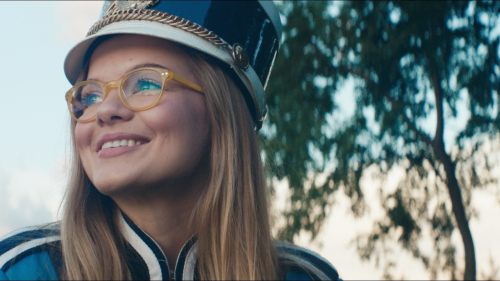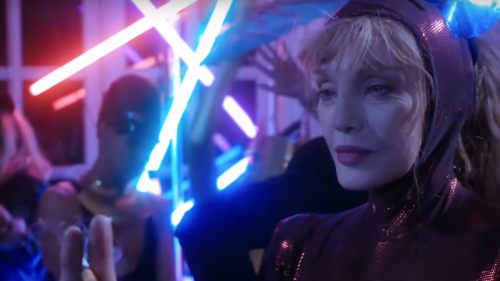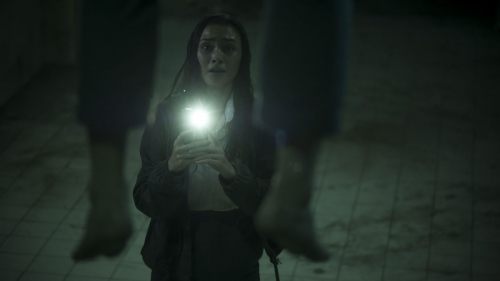Fantasia 2019 Review: KNIVES AND SKIN Mourns A Lost Generation
Knives And Skin has been compared to David Lynch’s work a lot - including in this year's Fantasia Film Festival programme. Given that its plot is kicked off by a girl going missing by a river, that the movie subsequently pays more attention to a range of subplots than the A-plot, and that its characters and dialogue are strange and heightened, it’s easy to see why. The similarities are definitely there. But Knives And Skin is more than a mere Twin Peaks ripoff. Rather, it sits at a nexus of Peaks, Donnie Darko, and River’s Edge, telling a multifaceted coming-of-age story in an unconventional, almost hallucinatory way.
Carolyn Harper is missing, and her small town has rallied together to find her. Or rather, they haven’t. Nobody quite knows how to respond to Carolyn’s disappearance, but the search continues all the same. Between Carolyn’s friends, family, and classmates, the town of Big River will reckon with much more than the vanishing of one girl. Strange things are afoot.
That’s the plot, ostensibly, but the real meat here lies in the stories of the characters circling around it. Everyone spends the movie dealing with their grief, but their coping mechanisms and their own issues vary wildly. Two girls tentatively begin a lesbian relationship. A family struggles with the pressures of infidelity, distrust, and an incoming third child. A student sells her mother’s prescription meds to her teacher. A sad clown hides his unemployment from his family by pretending to go to work, sitting in a field, and engaging in an affair. It's all odd, and all oddly captivating.
Writer-director Jennifer Reeder imbues all of this with an aesthetic so thick and palpable it might as well be a character in its own right. Christopher Rejano’s cinematography is all reds, purples, and browns, with Mike Olenick’s languid editing giving even daylit scenes a feeling of temporal ambiguity. The score, lush with synthesisers, is just as hazy, lending the film a dreamlike quality that will either hypnotise or repulse, depending on your attitude toward such things. Songs appear in the film both as soundtrack, and as diagetic musical numbers, the characters singing ‘80s pop tunes as slow a-cappella hymns. And characters behave in emotionally-true but logically-inexplicable ways.
Heightened, weird dialogue is difficult to do well, but Reeder nails it. Hilariously banal, creatively profane, and stunningly idiosyncratic, Reeder has created a highly-quotable patter that feels true to real-life girlhood and yet also entirely unique to her own characters and world. Some of it is made up of amusing non-sequiturs, but elsewhere the dialogue attains an air of disaffected poetry, bordering on the absurd. It helps, also, that Reeder’s cast is made up of terrific actors, and that she’s clearly got them all operating on the same wavelength. There's true consistency of voice here.
Reeder might have been born in the early ‘70s, but her film speaks to the generation currently emerging into adulthood in an uncertain world. Two scenes in particular really hold Knives And Skin together. In the first, a musical number midway through the film, the characters sing Naked Eyes’ “Promises Promises,” transforming it from a poppy breakup song into a lament for an entire generation. In the second, the students gather on their school’s rooftop to catch a glimpse at a distant highway poking above the trees, just to reassure themselves there’s a way out. Youth today often express a sense of hopelessness and betrayal, given the uncertain political and economic climate (and literal climate), and the dream, dashed a little bit more every year, that anyone can be anything they want to be. Knives And Skin paints lots of tiny pictures of that idea. Its young characters bristle to get out but have nowhere to go.
Knives And Skin is also a specifically female-driven movie in a way many “female-driven movies” aren’t. Most of its principal characters are women, certainly, but it’s the sheer variety of personality within the cast that makes it such a unique film about women. Each character has idiosyncratic style, attitude, and dreams, and underneath the detached veneer of the film, all are taken seriously. The film’s men, similarly troubled, are also taken seriously, but they’re mostly there to drive the women’s stories. So singular is this movie’s specific flavour of feminism - so convincing is its reclamation of slurs and the like - that our festival audience clamoured for merch bearing the phrase “I treat girls like shit.”
At nearly two hours, Knives And Skin could easily lose a little of its running time. But its slow, dreamy pace is also key to its success, just as in other noir tales less neon- and glitter-soaked than this one. Its weird narrative digressions, strange world-building, and stylistic flourishes all contribute to a portrait of the state of having nowhere to go. Strange, funny, beautiful, and profoundly melancholic, Knives And Skin begs to be seen big and loud. Look for it in cult-favourite lists in years to come.



